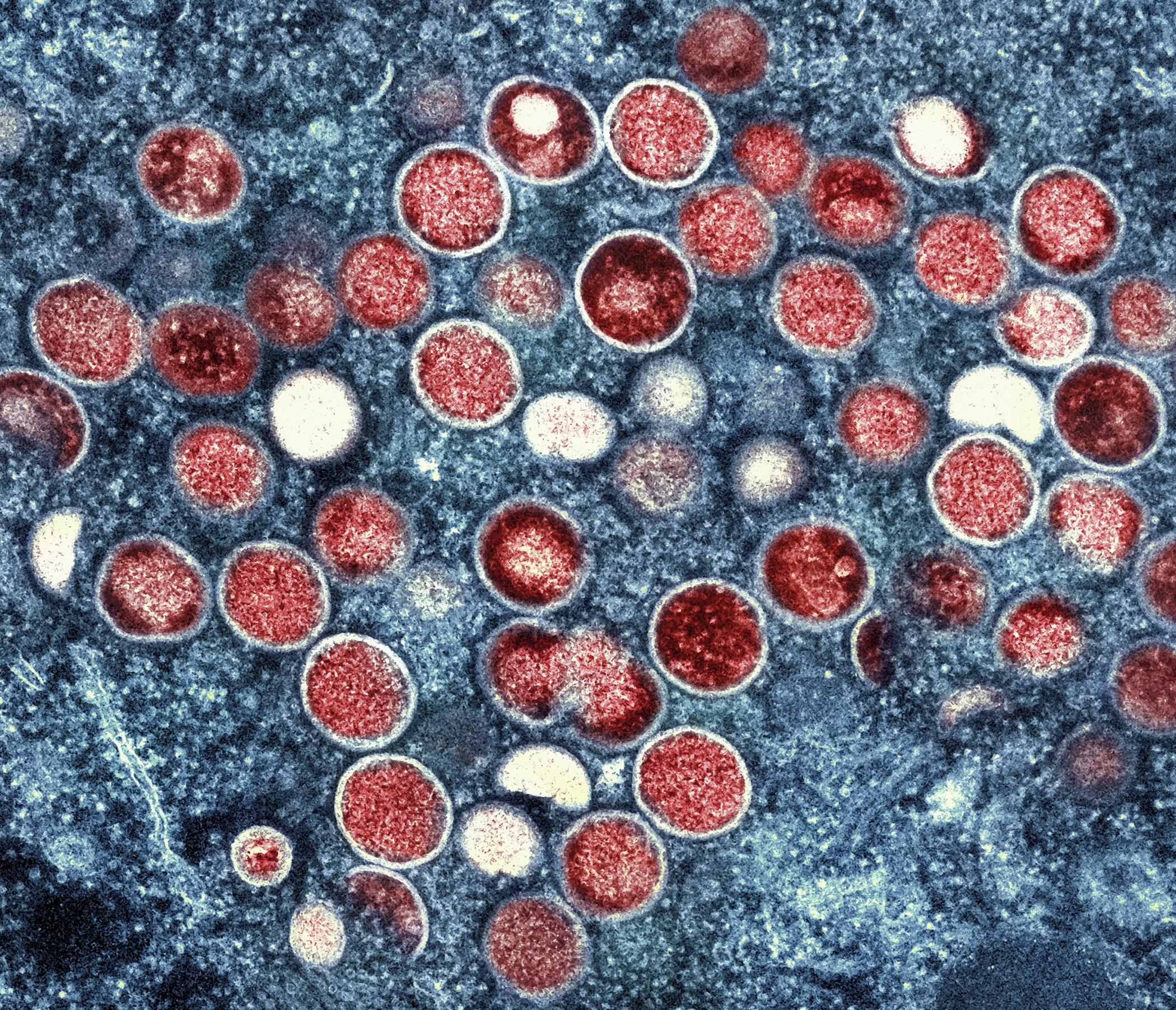
This undated image provided by the US National Institute of Allergy and Infectious Diseases shows a colorized transmission electron micrograph of mpox particles (red) found within an infected cell (blue), cultured in the laboratory, that was captured and color-enhanced at the NIAID Integrated Research Facility in Fort Detrick, Maryland. —NIAID via Associated Press, file
MANILA, Philippines — The Department of Health (DOH) on Wednesday confirmed two more patients of mpox from Metro Manila, bringing to three the mpox cases the country had recorded in the past two weeks and a total of 12 since July 2022.
Similar to the 10 previous cases, the two newest patients also both have Clade II, which is the less severe form of the monkeypox virus and not the Clade I forms, which are currently causing an upsurge in mpox cases in Africa.
Along with “Case 10,” the first mpox case in the country this year, the two latest cases are still recovering, and waiting for their symptoms to resolve.
READ: DOH: Year’s 1st mpox patient contracted the less severe form
READ: WHO: Anti-mpox jabs to go to Africa first
Mpox “Case 11” is a 37-year-old male from an undisclosed city in the National Capital Region (NCR), who first showed symptoms on Aug. 20, with distinct rashes appearing on his face, arms, legs, chest, palms, and soles.
“Initial investigation showed that Case 11 had no known exposure to any person with similar symptoms, but admitted to close, intimate and skin-to-skin contact within 21 days before the start of his symptoms,” the DOH said, noting that the man is in a government hospital.
Meanwhile, “Case 12” is a 32-year-old male, also from NCR, with symptoms that started on Aug. 14. He noticed skin lesions (clear, fluid-filled blisters) on his groin area and later developed a fever.
“He admits to close, intimate, and skin-to-skin contact with one sexual partner,” the DOH noted.
He sought consultation at an outpatient clinic and was initially managed as a case of a bacterial infection. But after a few days, he started having “pimple-like lesions” on the face, forehead, and scalp, prompting him to seek consultation at a government hospital. The patient has been in home quarantine since Aug. 23.
According to the DOH, the concerned local governments where Cases 11 and 12 were from had been informed, “and have the power and authority by law to disclose more detailed information, including response actions, at their discretion.”
Not airborne
Asked if the new cases were related to Case 10, Assistant Secretary Albert Domingo, the spokesperson for the DOH, said they “cannot determine yet any epidemiologic linkages. This is definitely one of the questions our epidemiologists are trying to answer as more information comes in.”
“We continue to see [the] local transmission of mpox Clade II here in the Philippines, in Metro Manila in particular. Mpox moves from skin-to-skin, both during sexual encounters and also other intimate forms of skin contact. It is not airborne,” Health Secretary Teodoro Herbosa said.
“Avoid close, intimate, skin-to-skin contact so as not to get mpox. Wash hands with soap and water. Cover your skin. Our health system will continue to detect and protect,” he added.
The Quezon City (QC) government earlier shut down a massage spa, which Case 10 visited on Aug. 11, for not having the proper permits.
On Monday, the local government announced that it closed another establishment, a sauna, after its management refused to cooperate with local authorities conducting contact tracing on possible mpox cases.
In a statement on Monday, the QC local government said it served a cease-and-desist order and notice of violation to Fahrenheit Cafe and Fitness Center, more known as F Club on E. Rodriguez Sr. Avenue, “for not allowing the city’s contact tracing team to conduct investigation and inquiries in the establishment.”
On Saturday, the City Epidemiology and Surveillance Division (QCESD) went to F Club to initiate contact tracing measures, following the DOH’s instructions for possible mpox transmission.
According to its social media accounts, F Club is an all male membership club bathhouse and has been operating since 2003.
In a message to the Inquirer, QCESD head Dr. Roland Cruz, however, clarified that the closure of F Club was “not related” to the three latest mpox cases.
“We consider this refusal to cooperate with our contact tracing efforts as a threat to the health and well-being of QCitizens. Our response and investigation are prompt, but they are hampered and delayed due to the lack of cooperation,” QC Mayor Joy Belmonte said.
Under Republic Act No. 11332, or the Mandatory Reporting of Notifiable Diseases and Health Events of Public Concern Act, noncooperation of the person or entities identified as having the notifiable disease or affected by the public health event is prohibited.
Belmonte ordered business owners to work closely with the city government, especially on public health concerns.
“I am calling on residents and business owners to cooperate with the city’s health event investigations. We are simply fulfilling our responsibility to ensure that all QCitizens are protected and safe,” she said.
Task force formed
The DOH has formed a national task force for mpox and reactivated a strategic advisory group that includes infectious disease experts Dr. Edsel Salvana and Dr. Rontgene Solante, and dermatologist Dr. Winlove Mojica.
On Aug. 22, Herbosa convened the DOH’s Emerging and Re-emerging Infectious Diseases Strategic Advisory Group of Experts to discuss the need to empower health workers like dermatologists, who are more likely to see suspect mpox cases given the clear skin symptoms of the disease.
Under a national action plan on mpox, the DOH would seek the help of the Philippine Dermatological Society in setting up a website where suspected cases or those experiencing mpox symptoms could avail of online consultations. This would reduce the number of suspected mpox patients flocking to hospitals.

